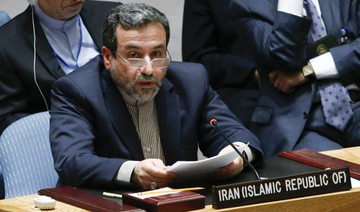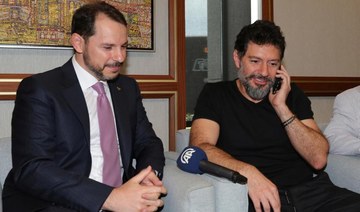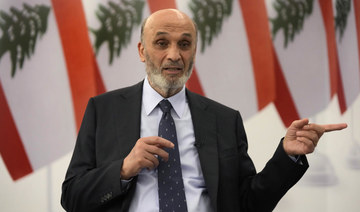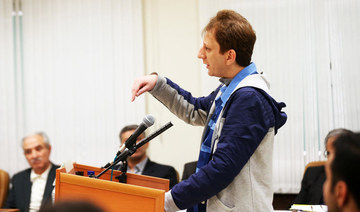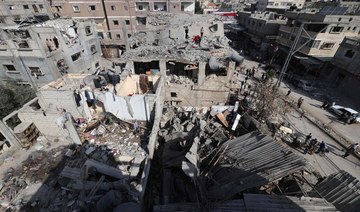TEHRAN: Iran’s supreme leader told Iraq’s visiting premier on Tuesday that Tehran will not interfere in Baghdad’s relations with Washington, but warned that the US presence next door to the Islamic republic was a cause of insecurity.
Prime Minister Mustafa Al-Kadhemi of Iraq met Ayatollah Ali Khamenei in the Iranian capital during his first trip abroad since taking office.
“Iran will not interfere in Iraq’s relations with America but expects Iraqi friends to know America and realize that their presence in any country causes corruption, ruin and destruction,” the Iranian leader said, according to his official website.
“The Islamic republic expects... (the Iraqi) parliament’s decision to expel the Americans to be adhered to since their presence is a cause of insecurity.”
Khamenei pointed to the US killing of Iran’s top general Qasem Soleimani in a January drone strike in Baghdad, after which parliament voted to expel US troops.
“They killed your guest in your house and blatantly confessed to it.”
Iran “will never forget this and will certainly deal a reciprocal blow to the Americans,” Khamenei said.
Iran retaliated for Soleimani’s death days after by firing a volley of missiles at US troops stationed in Iraq, but US President Donald Trump opted against responding militarily.
While the attack on the western Iraqi base of Ain Al-Asad left no US soldiers dead, dozens suffered brain trauma.
According to Khamenei, Iran was opposed to “whatever may weaken the Iraqi government” in contrast to the US, which he said did not want “an independent, strong Iraqi government elected by popular vote.”
Kadhemi had been scheduled to visit Saudi Arabia as his first trip abroad, then quickly follow it up with a trip to Tehran.
The Saudi leg was postponed after King Salman was hospitalized on Monday.
Kadhemi rose to the premiership in May after serving as head of Iraq’s National Intelligence Service for nearly four years.
He formed close ties to Tehran, Washington and Riyadh during that time, prompting speculation he could serve as a rare mediator between the capitals.
His trip to Tehran comes after he received Iran’s top diplomat Mohammad Javad Zarif in Baghdad on Sunday.
Relations between the two countries were not always close — they fought a bloody war from 1980 to 1988.
Tehran’s influence in Baghdad grew after the 2003 US-led invasion of Iraq toppled the government of Saddam Hussein.
Iran now has significant leverage over many of Iraq’s Shiite political groups.
Iraq’s delegation includes the ministers of foreign affairs, finance, health and planning, as well as Kadhemi’s national security adviser, some of whom also met their Iranian counterparts.
Kadhemi also held talks with President Hassan Rouhani to discuss closer trade ties, fighting the novel coronavirus and efforts to ensure regional stability, state television said.
Khamenei threatens US with ‘reciprocal blow’ over Soleimani strike
https://arab.news/nudvy
Khamenei threatens US with ‘reciprocal blow’ over Soleimani strike
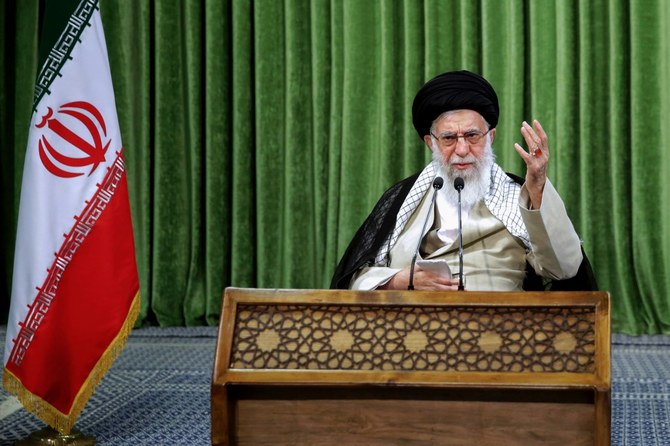
- American presence in any country causes corruption, the ayatollah said
- Iran “will never forget" the US killing of Suleimani, he added
UAE FM discusses Gaza with Israel’s opposition leader
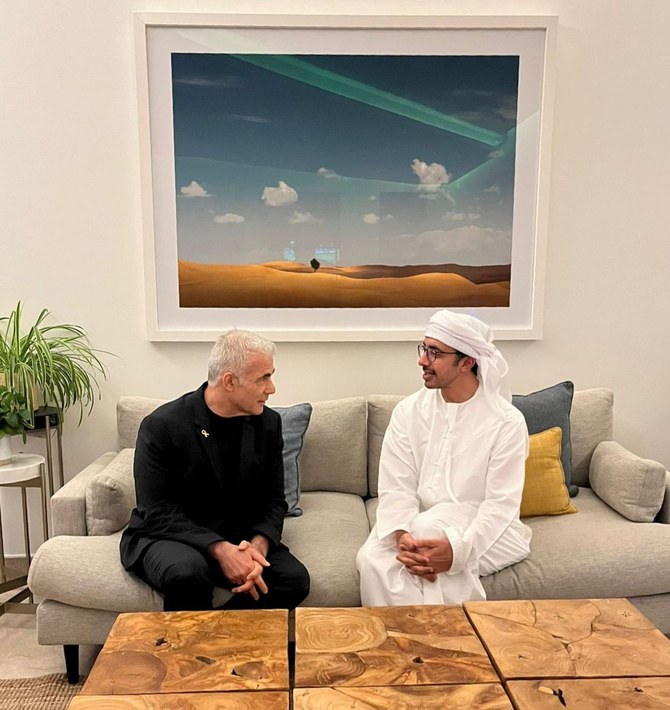
- Sheikh Abdullah stressed the need to restart talks on the two-state solution in Palestine
ABU DHABI: The UAE’s Foreign Minister Sheikh Abdullah bin Zayed Al-Nahyan held discussions on developments in Gaza with Israel’s opposition leader Yair Lapid in Abu Dhabi recently, Emirates News Agency reported on Thursday.
During the meeting, Sheikh Abdullah stressed the need to restart talks on the two-state solution in Palestine, which he said would ensure permanent regional peace and security.
He called for additional efforts to reach an immediate ceasefire in Gaza, which would prevent the conflict spreading to the rest of the region.
Sheikh Abdullah added that it was important for aid to reach Gaza, and that the lives of civilians should be protected.
Palestinian security force kills Islamic Jihad gunman in rare internal clash
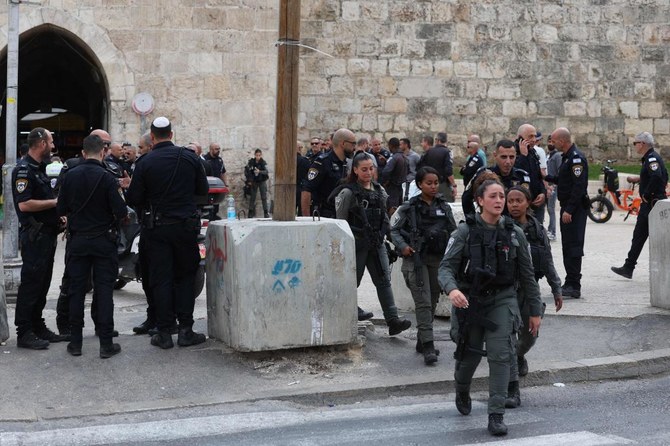
- Al-Foul was “treacherously ... targeted in his car” without provocation, the brigades said in a statement. “This crime is just like any assassination by Israeli special forces.”
RAMALLAH: Palestinian security officers killed a gunman in the occupied West Bank on Thursday, a rare intra-Palestinian clash whose circumstances were disputed and which the fighter’s faction described as an Israeli-style “assassination”.
Palestinian Authority security services spokesperson Talak Dweikat said a force sent to patrol Tulkarm overnight came under fire and shot back, hitting the gunman. He died from his wounds in hospital.
Videos circulated online, and which Reuters was not immediately able to confirm, showed a car being hit by gunfire.
A local armed group, the Tulkarm and Nour Shams Camp Brigades, claimed the dead man, Ahmed Abu Al-Foul, as its member with affiliation to the largely militant group Islamic Jihad.
Al-Foul was “treacherously ... targeted in his car” without provocation, the brigades said in a statement. “This crime is just like any assassination by Israeli special forces.”
President Mahmoud Abbas’ PA wields limited self-rule in the West Bank, and sometimes coordinates security with Israel.
Parts of the territory have drifted into chaos and poverty, with the PA and Israel trading blame, especially since ties have been further strained by Israel’s offensive in Gaza.
Hamas, an Islamic Jihad ally which rules the Gaza Strip and has chafed at Abbas’ strategy of seeking diplomatic accommodation with Israel, denounced “the attacks by the PA’s security forces on our people and our resistance fighters”.
Palestinian security forces and gunmen have exchanged gunfire several times in the last year, but deaths are rare.
EU offers 1 bln euros in economic, security support to Lebanon
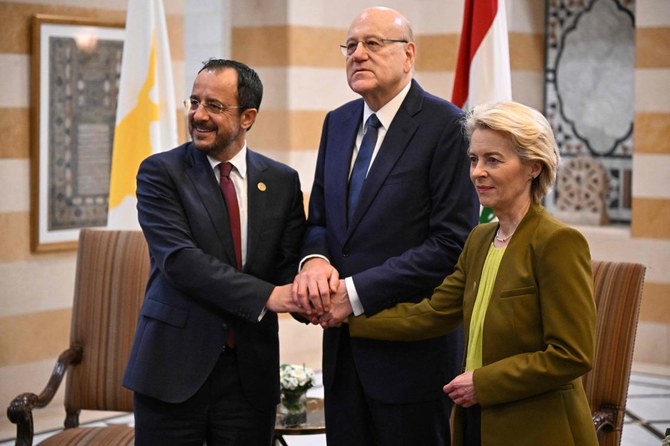
- The funds would be available from this year until 2027
BEIRUT: The European Union has offered Lebanon a financial package of 1 billion euros ($1.07 billion) to support its faltering economy and its security forces, European Commission President Ursula von der Leyen said on Thursday during a visit to Beirut.
Von der Leyen said the support package would help bolster basic services in Lebanon, including health and education, though she added that it was crucial for Beirut to “take forward economic, financial and banking reforms” to revitalize the business environment and banking sector.
Speaking alongside Lebanon’s Prime Minister Najib Mikati and Cypriot President Nikos Christodoulides, she said security support to the Lebanese army, the internal security forces and General Security would be focused on providing training, equipment and infrastructure to improve border management.
Lebanon’s economy began to unravel in 2019 after decades of profligate spending and corruption. However, vested interests in the ruling elite have stalled financial reforms that would grant Lebanon access to a $3 billion aid package from the International Monetary Fund.
As the crisis has been allowed to fester, most Lebanese have been locked out of their bank savings, the local currency has collapsed and public institutions — from schools to the army — have struggled to keep functioning.
In parallel, Lebanon has seen a rise in migrant boats taking off from its shores and heading to Europe – with nearby Cyprus and increasingly Italy, too, as the main destinations, researchers say.
Iran slaps sanctions on US, UK over Israel support
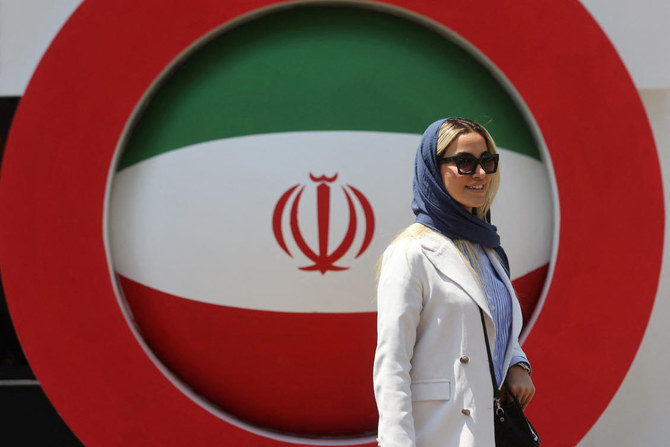
- Sanctions targeted seven Americans
- British officials and entities targeted include Secretary of State for Defense Grant Shapps
TEHRAN: Iran announced on Thursday sanctions on several American and British individuals and entities for supporting Israel in its war against the Palestinian militant group Hamas.
The Islamic republic, the regional arch-foe of Israel, unveiled the punitive measures in a statement from its foreign ministry.
It said the sanctions targeted seven Americans, including General Bryan P. Fenton, commander of the US special operations command, and Vice Admiral Brad Cooper, a former commander of the US Navy’s Fifth Fleet.
British officials and entities targeted include Secretary of State for Defense Grant Shapps, commander of the British army strategic command James Hockenhull and the UK Royal Navy in the Red Sea.
Penalties were also announced against US firms Lockheed Martin and Chevron and British counterparts Elbit Systems, Parker Meggitt and Rafael UK.
The ministry said the sanctions include “blocking of accounts and transactions in the Iranian financial and banking systems, blocking of assets within the jurisdiction of the Islamic Republic of Iran as well as prohibition of visa issuance and entry to the Iranian territory.”
The impact of these measures on the individuals or entities, as well as their assets or dealings with Iran, remains unclear.
The war in the Gaza Strip erupted after the October 7 attack by Palestinian militants on Israel which killed 1,170 people, mostly civilians, according an AFP tally based on official Israeli figures.
Iran backs Hamas but has denied any direct involvement in the attack.
Israel’s retaliatory offensive against Hamas has since killed at least 34,568 people in Gaza, mostly women and children, according to the Hamas-run territory’s health ministry.
12-truck UAE aid convoy enters Gaza Strip

- UAE has also sent Palestinians food, water via sea, air
- Emirates has provided medical treatment for thousands
Al-ARISH: A UAE aid convoy entered the Gaza Strip on Wednesday via Egypt’s Rafah Crossing Point as a part of the country’s “Operation Chivalrous Knight 3” project to support the Palestinian people, UAE state news agency WAM reported on Thursday.
The 12-truck convoy is transporting over 264 tonnes of humanitarian aid including food, water and dates.
The latest convoy now brings to 440 the number of trucks that have been used for support efforts.
As of May 1, 2024, the UAE has now provided the Palestinians 22,436 tonnes of aid, which has included the deployment of 220 cargo planes and three cargo ships. The goods pass through Al-Arish Port and the Rafah crossing into Gaza.
These efforts are a part of the “Birds of Goodness” operation, which involves aerial drops of humanitarian supplies. By Wednesday, 43 drops have been conducted, delivering a total of 3,000 tonnes of food and relief materials to inaccessible and isolated areas in Gaza.
Since its establishment, medical staffers at the UAE’s field hospital in Gaza have treated more than 18,970 patients. An additional 152 patients were evacuated to the UAE’s Floating Hospital in Al-Arish Port, and 166 to the UAE for treatment.
The UAE has set up six desalination plants with a production capacity of 1.2 million gallons per day to support the people in Gaza.



